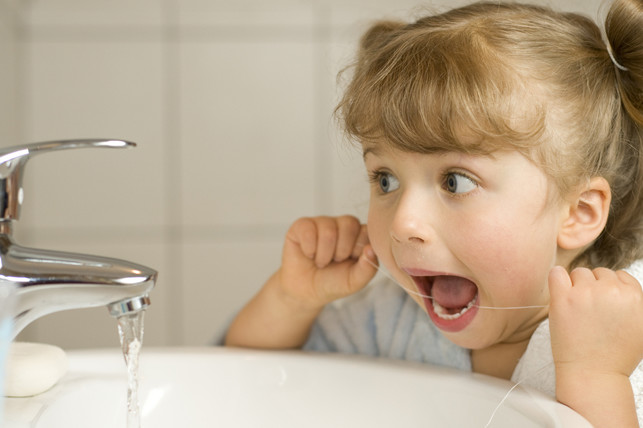Is Your Child in Danger of Suffering Serious Oral Illness?

Tooth brushing only cleans about 1/3 of total tooth surface area, making flossing an absolute necessity for your child to develop a healthy smile that is not encumbered by cavities and other ailments. If your child is not flossing, tartar and plaque can build up between their teeth and cause cavities and even lead to gingivitis. Outside of watching your child floss every day, how can you be sure that your child is flossing? Below are some unmistakable signs that result from irregular flossing.
Bleeding Gums
Not brushing and flossing regularly can cause swollen, sensitive gums that bleed when they are brushed. Bleeding gums are often an early indication of gingivitis, otherwise known as gum disease. Plaque between teeth that is not flossed away can infect the gum line and lead to gingivitis.
The bottom line is this: if your child has tender, swollen gums that bleed when they brush or floss, then it’s time to schedule an appointment and evaluate their oral health. Gum disease is very treatable and can be prevented by regular brushing and flossing.
Bad Breath (Halitosis)
Food debris that’s stuck between teeth can provide a feeding ground for unhealthy bacteria to thrive. The bacteria buildup can emit sulfur compounds that smell awful and leave a bad taste in your child’s mouth. If your child has bad breath that smells similar to rotten eggs, then they may have excessive bacteria buildup.
Excessive Plaque and Cavities
If your child is not flossing, then plaque can build up between their teeth and lead to cavities. Plaque is colorless and difficult to see. When you eat, the bacteria in plaque use the sugars found in your food to create an acid that attacks your teeth. Repeated acidic attacks can wear down tooth enamel and lead to cavities, gingivitis and periodontal disease.
Tartar Buildup
Excessive plaque buildup can eventually turn into tartar – a hard, dark substance that can make it harder to clean teeth. Tartar buildup can cause gum disease, and lead to serious gum infections. These infections can damage the tissue that holds teeth in place, and lead to tooth loss. Additionally, tartar can’t be brushed or flossed away like plaque, and can only be removed by professional dental treatment.
Your Child Should Floss Everyday
Brushing alone won’t keep your child’s mouth completely healthy. They should brush twice per day for two minutes at a time and floss once per day. You can help your child prevent a bevy of oral ailments by convincing them to floss everyday. Schedule an appointment with our office today if your child has unnaturally bad breath or experiences bleeding gums when they brush their teeth. We will thoroughly evaluate their mouth and determine the best treatment plan for them based upon our findings.
